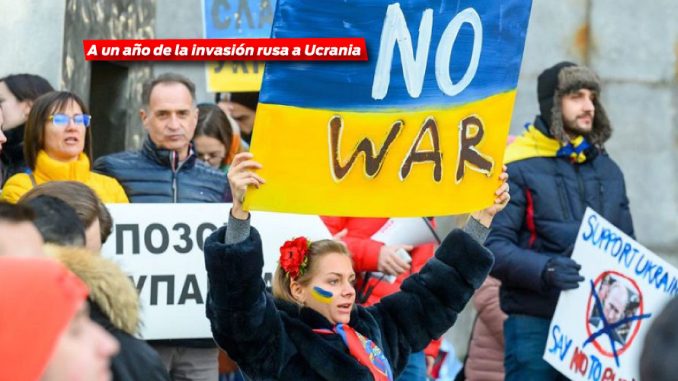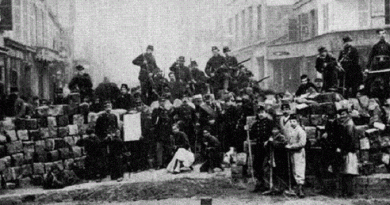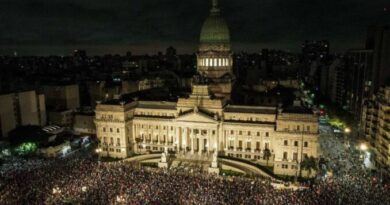Belarusian workers have no desire to fight in Ukraine
Then, we reproduce a note from 23/02/2023, published by the Salidarnast Association, registered in Bremen, Germany. It was founded by trade union leaders and activists from Belarus, who were forced to leave the country after the ban on free and democratic trade unions and the repression of their leaders and activists.
“Acting Chairman of the Congress of Democratic Trade Unions of Belarus, Maxim Pazniakou, believes that neither the Belarusians nor Lukashenko are ready to fight for the interests of Russia, are you sure about this. Nevertheless, will this be enough to refrain from war?
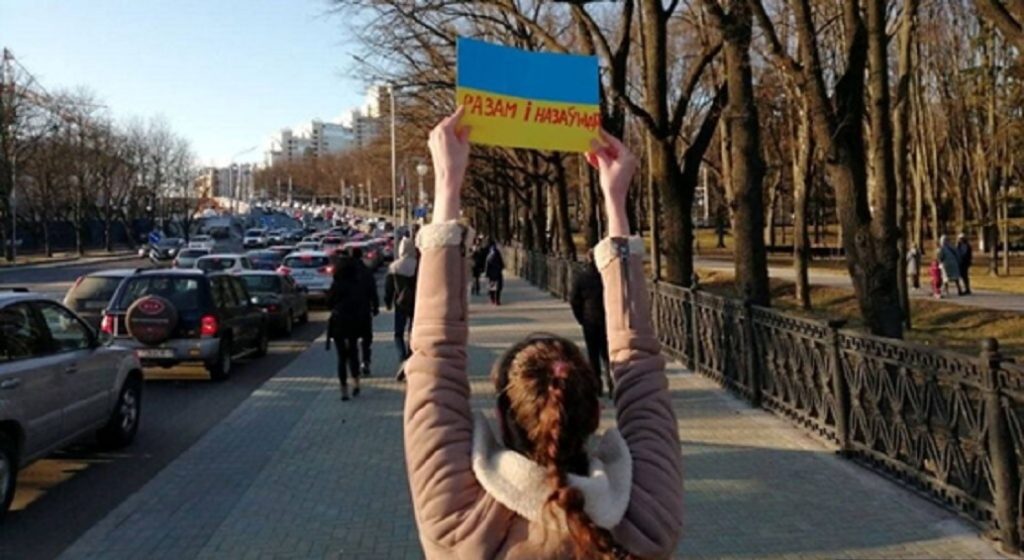
War is a big phobia for Belarusians; but both the Lukashenko regime and the opposition forces are using this phobia now. Neither side is directly in favor of the war., though all have chosen sides in the conflict. We tried to find out: what do Belarusian workers think about the war in Ukraine?
Recently, Sviatlana Tsikhanouskaya's office urged Belarusians to be prepared for war and to do everything possible to“protect themselves and their loved ones”. The alarming appeal made everyone wonder: why did the political opposition alarm people? Do they possess such information that proves that Belarus will inevitably be involved in the war?
Probably, the Tsikhanovskaya office was thinking aloud after a break to return to the briefing schedule. Whether it's a public relations move, or the presence of an infiltrator, or both at the same time, touched the main nerve of the Belarusians. Your main phobia.
Stability as a core value
Stability and peace were the main ideologies that defined the foundations of the current regime in Belarus.. The victory of the USSR in World War II and the enormous human losses, stability and a peaceful sky: all this was the main leitmotif of state propaganda during the last 30 years. And for good reason: the main argument of Lukashenko's policy, until some time ago, it sounded like that: I wish there was no war.
The dictator himself likes to put on the mask of a peacemaker and guarantee stability. This was the case during Russia's aggression against Georgia in 2008 Y 2014; during the hostilities in Donbass, when Minsk officially assumed the role of a trading platform. At one of his public gatherings, Lukashenko proudly declared that“the world community considers Belarus as a donor of regional security”.
From August 2020, with the violent repression of peaceful protests in Belarus and the use of army units, the dictator's rhetoric began to change. To stay in power, sustain constant terror and consolidate its objectives, saw the need to justify the militarization of the country.
State media use a propaganda stamp about the external threat and the militarization of neighboring countries. The provocative Belarusian regime brought ten thousand immigrants from the Middle East to the border with these countries. It is gradually becoming a“regional security donor” in a"danger donor".
Analysts interpreted Lukashenko's provocation as an attempt to incite a border conflict, to divert attention from the questions about its legitimacy that were developed in 2020. The dictator's goal might have been to secure his position. But the situation changed drastically in the winter of 2022.
An ally of the bully
On the night of 24 February, units of the Russian troops began to shell Ukraine with rockets and bombs from all possible directions. For millions of Belarusians, the most shocking moment of those days was the fact that a part of the Russian troops invaded Ukraine from the territory of Belarus, where, so to speak, they were conducting joint exercises with the Belarusian army. Belarusians became hostages to Lukashenko's personal decision to allow Russian aggression from the territory of a sovereign country.
– There was anger at impotence, for not being able to do anything and help somehow, – dice Pavel, who at that time worked in Belarus. – I watched the Ukrainian news all the time, all these missile attacks on ukrainian cities only caused me hatred and anger. I started looking for an opportunity to help financially and started donating money to the Armed Forces of Ukraine and civilians who had to leave their homes..
The state of shock paralyzed active Belarusians for several days. The feeling of helplessness has become basic for the majority of citizens. But this did not prevent four days later after the start of the war, thousands of demonstrators flock to the protests in Minsk. And this happened despite the fact that repressions and massive arrests have been taking place in the country for more than a year.. That day, 28 February, more of 800 protesters were detained near the building of the Ministry of Defense of the Republic of Belarus.
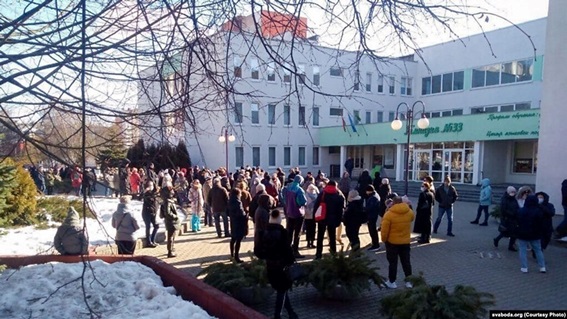
Even after the arrests, the Belarusians did not accept the war. Dozens of acts of sabotage took place on the Belarusian railway used to transport Russian military equipment. During the arrest of the Belarusian railway partisans, the authorities fired at them with military weapons. They shot in the knees of the detainees and showed the wounded on the propaganda channels of state television, scaring other people willing to resist.
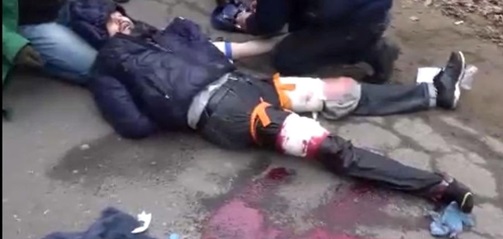
To this day, in Belarus the hunt for those who speak out against the war continues, leak information about the movement of Russian military equipment or post messages of solidarity with the Ukrainian people.
An exemplary case was the arrest and trial of pop singer Mary Gerasimenko, who performed a song by the Ukrainian band“Ocean Elzy” at one of his concerts in Belarus. All Ukrainian national symbols, as well as the Belarusians, become grounds for arrest. Thus, one really gets the impression that Belarus is secretly under Russian occupation.
protest exodus
The regime officially continues to support Russia, his last ally, providing everything necessary for your support: Military equipment, test sites, transportation infrastructure, instructors for the training of the mobilized. But society itself does not support Lukashenko's military orientation. Despite the fact that all the media, television and radio are in the hands of the state. Anyway, Belarusians do not support the war.
During the conversation with us, a businessman from Minsk, which is currently located in Belarus, He pointed out that he had not even seen people supporting the war:
“Among those with whom I communicate, I did not see a single person who approves military actions. There are people who say that a war was brewing, or that something was going to happen. But I don't know anyone who approves of war.".
For many citizens who were apolitical, this position of Lukashenko on the war became unacceptable. Those who had the opportunity to do so, they decided to emigrate.
Even the participants in the protests of 2020, which continued in Belarus, they started to leave. Those who did not have the opportunity to obtain a visa for the European Union, went to Georgia or Central Asia. They were mainly representatives of small and medium-sized companies, and representatives of the IT sphere.
According to Polish migration services, Lithuania, Latvia, Ukraine and Georgia, more of 100.000 citizens left Belarus between 2020 Y 2023. Some experts claim that 300.000 they have left the country. The latest wave of mass exodus was chained by reports of imminent mobilization in Belarus.

He killed you, a businessman from Minsk who moved to Batumi (Georgia) a few months ago, believes that the reason many left the country was a complex of problems, but the country's involvement in the war was a key moment:
“The war had an impact, Of course. There is absolutely no judiciary, there are no laws that protect people. Thus, no sense of security. It is understood that your business is carried out as long as the authorities do not touch it; but as soon as the authorities start an investigation against you, you can lose everything or go to prison. This is despite the fact that you are running a legal business and paying taxes.. I think that the Belarusian people and the army, after all, They will not enter into this unnecessary and meaningless conflict.".
The voice of the workers
Among the protests of 2020 and the beginning of the war, a small number of non-governmental organizations remained legally established in Belarus. During this time, the authorities liquidated about 700 organizations and initiatives.
Las únicas organizaciones de masas que quedaron en Bielorrusia en ese momento fueron los sindicatos democráticos. Of course, la dirección del Congreso de Sindicatos Democráticos de Bielorrusia, BKDP, no pudo sino condenar a los agresores. Thus, BKDP llamó abiertamente a Rusia a detener la guerra y condenó la complicidad del régimen bielorruso en la agresión. Unas semanas más tarde, los sindicatos fueron registrados, los líderes sindicales y los activistas fueron arrestados y, más tarde, todos los sindicatos independientes fueron liquidados. Today, more of 40 representantes de sindicatos independientes han sido condenados y decenas están en prisión.

Maxim Pazniakou, presidente interino del Congreso Bielorruso de Sindicatos Democráticos (BKDP) que logró salir de Bielorrusia, cree que cualquier guerra es inaceptable para la mayoría de los trabajadores bielorrusos:
“Si tenemos en cuenta los datos de los estudios sociológicos, vemos que la mayoría de los trabajadores no apoya la guerra. Lo más probable es que esto se deba a varias razones. First, el rechazo histórico a la guerra es característico de los bielorrusos. Hemos sobrevivido a muchas guerras que han pasado por nuestro territorio. Todos los horrores de la guerra quedaron en la memoria genética. Secondly, está el miedo a tener que luchar. No hay tontos entre los trabajadores que estén dispuestos a bajar la cabeza por algo desconocido. Los bielorrusos no tienen ambiciones imperialistas. Thus, no hay intereses bielorrusos en la guerra de agresión que Rusia está librando actualmente. In third place, son muy buenas relaciones de vecindad entre bielorrusos y ucranianos”.
El sindicalista cree que la mayoría de los jóvenes tratará de evitar la movilización:
“Porque esta es una nueva generación que fue criada con principios humanistas. Las protestas de 2020 demostraron que la sociedad está en contra de la violencia. Lo más probable es que las personas mayores participen silenciosamente en la movilización, pero estarán muy desmotivados como soldados. Pienso que ni siquiera los representantes del poder represor estatal están motivados y dispuestos a participar en masa en esta guerra. Why, partly, la gente fue a servir en estas estructuras estatales para conseguir vivienda, préstamos baratos y una pensión que no está mal para los estándares de Bielorrusia. Thus, si Lukashenko reúne un ejército, su efectividad será muy dudosa. Estoy seguro de que, si hay una guerra con la participación de Bielorrusia, será una guerra de defensa para las autoridades de Bielorrusia. O si las hostilidades se trasladan a nuestro territorio. Entonces para Lukashenko será la protección de su poder y de su vida.
Yahor, un empleado de una empresa de Salihorsk, cree que los trabajadores están intimidados, al igual que toda la sociedad:
“La gente está preocupada, pero al mismo tiempo se tranquiliza: no nos afectará y Lukashenko no arriesgará al ejército bielorruso. But at the same time, el miedo a la guerra siempre está presente. En cuanto a la participación de Bielorrusia en la guerra, no lo descarto, es posible”.
Aliaksandr, un empleado de una de las empresas de Gomel cree que hay pocos partidarios del “mundo ruso” y la guerra en la fuerza laboral:
“La mayoría de los trabajadores condenan el inicio de la guerra y se manifiestan en contra, pero todos tienen miedo de exponer abiertamente su posición. Porque es muy peligroso y por condena puedes ir, in the best case, un día a la cárcel. Thus, cuando las personas hablan de este tema, eligen el entorno seguro en el que lo hablan. Si hablamos de la relación porcentual, in my opinion, alrededor del 85% de los trabajadores están en contra de la guerra y el 15% son los que apoyan a Rusia en contra de Ucrania. Cuanto más se prolongue todo esto, menos probable es que Bielorrusia se involucre en esta guerra.
Oksana, empleada de una empresa en Brest, cree que esta guerra será fratricida para los bielorrusos:
“Muchos de mis amigos y parientes tienen familiares en Ucrania. Mi esposo es ucraniano por nacionalidad. Seguimos apoyando a los ucranianos desde febrero pasado. Estamos en contra de la guerra desatada por Rusia. No pasa un día en círculos cerrados sin discutir las noticias de Ucrania. Nos comunicamos con familiares desde allí. Nos cuentan las terribles realidades de la guerra.
Los compañeros de trabajo también están en contra de la guerra, la condenan. Quieren que todo acabe pronto. After all, algunos también tienen familiares allí con quienes se mantienen en contacto. Ahora en el trabajo escucho poca discusión sobre la guerra en Ucrania. Tal vez tengan miedo, o tal vez simplemente no quieran compartir su dolor con otras personas. No observé defensores ardientes de Rusia en esta guerra, pero también existen, como me dijeron mis colegas.
Me inclino más por el hecho de que Bielorrusia no participará en las hostilidades. Todos los hombres de mi círculo dicen que no irán a luchar contra los ucranianos. Esto es agradable y da esperanza de que los bielorrusos no irán a tierras extranjeras con armas”.
Aunque entre los bielorrusos hay bastantes partidarios de las acciones de Rusia en Ucrania, no fue posible hablar con ellos. También hay una categoría de aquellos que están listos para defender los intereses rusos con armas, pero los sociólogos creen que esta es una parte bastante pequeña y marginal de la sociedad.
Cada vez son menos los que están a favor de la guerra
Los investigadores también intentaron averiguar la actitud de la sociedad bielorrusa ante los acontecimientos militares. Los estudios más recientes se realizaron en el otoño de 2022. Fueron realizados conjuntamente por «Belarusian Analytical Workshop» y «Chatham House».
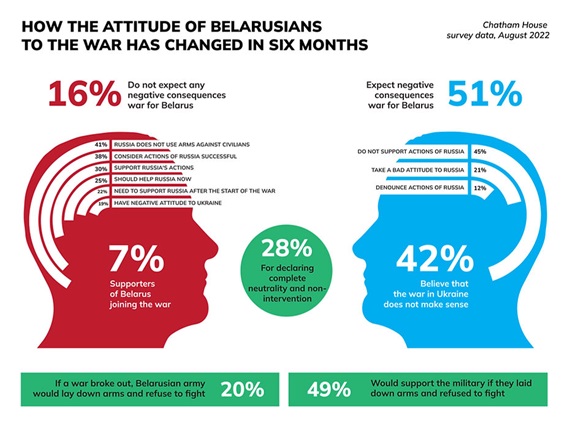
El doctor en Ciencias Sociológicas Andrei Vardamatski informó que la gran mayoría de los bielorrusos, incluidos los representantes del régimen, están en contra de la entrada de tropas bielorrusas en Ucrania: he 85% de los encuestados. He 51% de los encuestados desaprueba las acciones de Rusia en Ucrania, mientras que casi el 40% las aprueba. more than 50% simpatiza con Ucrania y solo el 20% with Russia. He 61% de los encuestados no considera a Bielorrusia como cómplice del conflicto, he 33% yes.
Según la investigación de “Chatham House”, he 42% de los bielorrusos considera que la guerra en Ucrania, desatada por Rusia, carece de sentido. Así lo informó el jefe de la iniciativa bielorrusa «Chatham House» Ryhor Astapenia.
A) Yes, según la encuesta, el número de los que creen que era necesario apoyar a Rusia tras el inicio de la guerra (sin que Bielorrusia se uniera a ella) disminuyó un 6% in six months (of the 28% al 22%). Y los que están a favor de la guerra son cada vez menos. At the same time, la idea de que Bielorrusia entrara en la guerra de un lado u otro era, y sigue siendo, marginal. Total, solo el 7% de los partidarios de Bielorrusia se unieron a la guerra. He 45% de los bielorrusos no apoya las acciones de Rusia. Hay que tener en cuenta que el 30% de los encuestados expresó su apoyo total o parcial.
Los entrevistados también creen que el ejército bielorruso intentaría evitar participar en la guerra si Bielorrusia lo decidiera. In August 2022, he 20 % de los encuestados respondió que nuestros soldados y oficiales se negarían a luchar y depondrían las armas. Es interesante que en abril de 2022 las acciones del ejército bielorruso de deponer las armas fueron aprobadas por el 42% de los encuestados, luego en agosto el 49% apoyó tal decisión.
¿Importa la opinión de los ciudadanos?
La representatividad de la investigación sociológica podría ser cuestionable; Nevertheless, el cuadro general muestra la actitud de la sociedad: los bielorrusos no quieren participar en la guerra. further, los funcionarios estatales no expresan la opinión de los residentes del país, aunque los servicios sociológicos estatales pueden proporcionar los resultados que ordena el estado.
Lo más probable es que las autoridades también conozcan perfectamente la posición de la abrumadora mayoría de los ciudadanos y estén tratando de preservar al menos la última de las promesas del régimen: no participar en una guerra abierta. further, los éxitos militares de Rusia parecen frágiles. Thus, la retórica beligerante del dictador bielorruso comenzó a cambiar un poco. Aquí hay un recordatorio público de la idea de un pacto de no agresión con Ucrania, así como una garantía para sus partidarios de que el dictador no tiene planes de atacar a Ucrania:
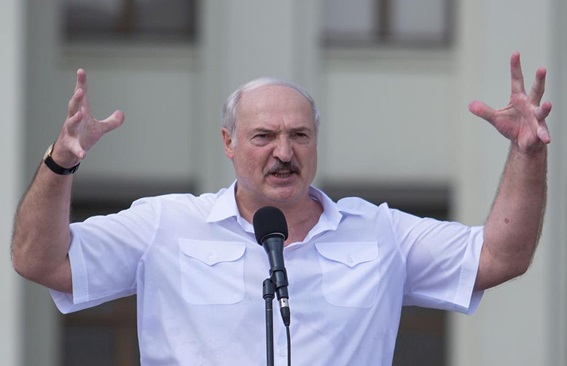
“Hoy gritan: “¡Lukashenko quiere enviar sus tropas a Ucrania!” Ya he dicho 1.200 veces que no tengo tales planes. […] No tenemos nada que hacer allí – en Ucrania. Y no necesitamos enviar gente a luchar allí”.
Pero ¿se pueden tomar en serio estas declaraciones? Muchos recuerdan la declaración de Lukashenko de 2015 de que Bielorrusia nunca atacará a Ucrania. Nevertheless, luego agregó que si no contradice los intereses del país.
El principal interés de Lukashenko es su poder, que hoy depende completamente del apoyo de Putin. Y el destino de Putin y Rusia ahora se está decidiendo en Ucrania. Therefore, todo dependerá de si Rusia necesita carne de cañón bielorrusa o no.
Y casi nadie preguntará la opinión de los ciudadanos de Bielorrusia. Las autoridades no han hecho esto durante los últimos 30 years. Tampoco lo harán ahora. further, la obediencia es una característica específica de los bielorrusos. Y los resultados de la reconciliación del número de ciudadanos reclutados de la República de Bielorrusia, que tuvo lugar hace un mes, confirman esta opinión. Según el Ministerio de Defensa de la República de Bielorrusia, he 95% de los reclutas llegaron a las comisarías militares en la primera llamada.
Se obtiene una triste conclusión. Los bielorrusos en masa no apoyan la guerra y no quieren participar en ella, y su opinión no afecta las acciones del régimen político del país. El problema de los bielorrusos es la falta de subjetividad”.
Author: Felipe Stary

